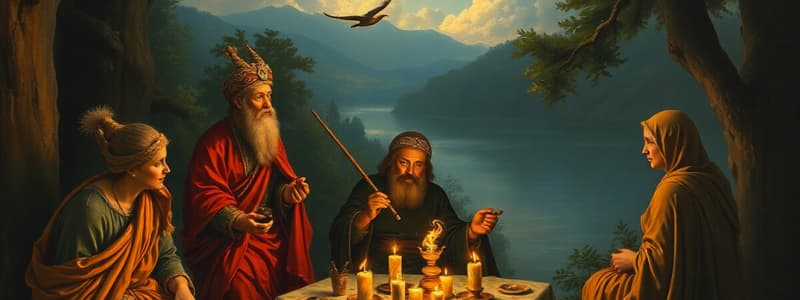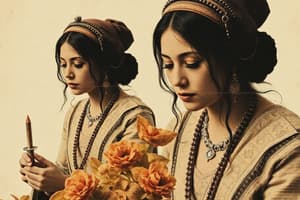Podcast
Questions and Answers
Who served as the religious leader in household religion during ancient times?
Who served as the religious leader in household religion during ancient times?
- The youngest female
- The eldest male (correct)
- A neighbor
- A priestess
Women were allowed to hold leadership positions within household cults.
Women were allowed to hold leadership positions within household cults.
False (B)
What was the name of the festival celebrated for Demeter and Persephone?
What was the name of the festival celebrated for Demeter and Persephone?
Thesmophoria
Zeus Herkeios is depicted with a ______ to ward off evil.
Zeus Herkeios is depicted with a ______ to ward off evil.
Match the following household gods with their roles:
Match the following household gods with their roles:
At what age did boys undergo military training as ephebes?
At what age did boys undergo military training as ephebes?
The household rituals primarily involved the participation of women.
The household rituals primarily involved the participation of women.
What is the significance of the Amphidromia ceremony?
What is the significance of the Amphidromia ceremony?
Which epithets are specifically associated with Apollo?
Which epithets are specifically associated with Apollo?
Hestia's worship is linked only to household religion.
Hestia's worship is linked only to household religion.
What was the purpose of the Pythian Games?
What was the purpose of the Pythian Games?
The priests and priestesses were appointed based on ______.
The priests and priestesses were appointed based on ______.
Match the following gods with their corresponding games:
Match the following gods with their corresponding games:
Which archon supervised civic festivals like the City Dionysia?
Which archon supervised civic festivals like the City Dionysia?
Pollution in Greek religion had no severe consequences.
Pollution in Greek religion had no severe consequences.
What was the centerpiece of the Great Panathenaia festival?
What was the centerpiece of the Great Panathenaia festival?
Ritual cleansing, known as ______, involved washing with water.
Ritual cleansing, known as ______, involved washing with water.
Which of the following was a cause of miasma in Greek religion?
Which of the following was a cause of miasma in Greek religion?
Sacred funds were unregulated in ancient Athens.
Sacred funds were unregulated in ancient Athens.
What was the significance of the Stoa at Delphi?
What was the significance of the Stoa at Delphi?
The competition for the most beautiful male at the Panathenaia was called ______.
The competition for the most beautiful male at the Panathenaia was called ______.
What was an Apobates?
What was an Apobates?
Flashcards
Household Leader - kyreios
Household Leader - kyreios
The head of the household, typically the father, who served as the priest and leader of religious ceremonies.
Zeus Ktesios
Zeus Ktesios
A god who protected the household possessions, often depicted with a white ribbon.
Zeus Herkeios
Zeus Herkeios
A god who safeguarded the courtyard, often accompanied by a snake symbol.
Apollo Agyieus
Apollo Agyieus
Signup and view all the flashcards
Hearth
Hearth
Signup and view all the flashcards
Herms
Herms
Signup and view all the flashcards
Welcome Ritual
Welcome Ritual
Signup and view all the flashcards
Genesia
Genesia
Signup and view all the flashcards
Miasma
Miasma
Signup and view all the flashcards
Delphinios
Delphinios
Signup and view all the flashcards
Pythios
Pythios
Signup and view all the flashcards
Lykeios
Lykeios
Signup and view all the flashcards
Apotropaios
Apotropaios
Signup and view all the flashcards
Murder (as a source of miasma)
Murder (as a source of miasma)
Signup and view all the flashcards
Temenos
Temenos
Signup and view all the flashcards
Agora
Agora
Signup and view all the flashcards
Stoa
Stoa
Signup and view all the flashcards
Prytaneion
Prytaneion
Signup and view all the flashcards
Euandrion
Euandrion
Signup and view all the flashcards
Purification (katharsis)
Purification (katharsis)
Signup and view all the flashcards
Exegetai
Exegetai
Signup and view all the flashcards
Priests and priestesses
Priests and priestesses
Signup and view all the flashcards
Study Notes
Household Religion
- Household religion occurred within the oikos (household).
- The father (eldest male) acted as the religious leader, overseeing rituals.
- Household Gods:
- Zeus Ktesios: Protected household possessions (kept in storerooms, draped in white ribbon).
- Zeus Herkeios: Safeguarded courtyards (depicted with a snake).
- Apollo Agyieus: Protected entrances (often symbolized by a pillar or statue).
- Household Rituals:
- Hearths were dedicated to Hestia, signifying family unity. New members (slaves, brides) were welcomed with fire ceremonies.
- Herms (rectangular pillars with phalli) were placed at crossroads to protect households.
- Father's Duties:
- Maintained family tombs.
- Offered libations at festivals like the Anthesteria (wine) and Genesia (honoring the dead).
Women in Religion
- Women were excluded from leading household cults but participated in civic and communal rituals.
- Priestesses:
- Athens had 40 female priesthoods.
- Eligibility required embodying the goddess's traits:
- Demeter: For older women.
- Artemis: For virgins.
- Examples of Women's Roles:
- Arrephoroi: Young girls carried sacred baskets to the Acropolis for Athena Polias.
- Grinders: Prepared cakes for Athena's altar.
- Brauronia: Young girls dressed as bears for Artemis' festival.
- Basket-Bearers: Carried sacrificial tools during processions.
- Festivals:
- Thesmophoria: A festival for Demeter & Persephone, restricted to adult women.
- Women performed mourning rituals for the dead, including cutting hair, wearing black, and wailing.
Children and Slaves
- Children:
- Amphidromia: Celebrated on the 5th or 7th day after birth; part of a naming ceremony.
- Legitimate sons were introduced to their phratry at Apaturia (within a year of birth).
- At 16, they made sacrifices to Zeus Phratrios & began military training (ephebes).
- Slaves:
- Limited religious participation.
- Slaves sometimes sought sanctuary in temples during hardship.
Religious Participation
- Deme Participation:
- Athens was divided into demes, which celebrated locally funded festivals.
- The Erchia Calendar (4th century BC) shows 25 days of sacrifices (e.g., to Athena Polias and local heroes).
- Specific epithets of Apollo were worshipped (e.g., Apotropaios, Delphinios, Lykeios, Pythios).
- Polis Participation:
- The polis funded large-scale religious events (temples, festivals, sacrifices), encouraging civic unity.
- Hestia worship connected household and civic religion.
- Panhellenic Participation:
- Location | God Worshipped | Epithet Meaning | Games Held
- Delphi | Pythian Apollo | Apollo who slew the Pytho serpent | Pythian Games
- Olympia | Olympian Zeus | Zeus of Olympus, ruler of gods | Olympic Games
- Nemea | Nemean Zeus | Zeus of Nemea | Nemean Games
- Isthmus | Poseidon of Isthmus | Poseidon of the Isthmian sanctuary | Isthmian Games
Religious Authority
- Priests and Priestesses:
- Oversaw rituals (sacrifices, libations) and temple maintenance.
- Some were appointed hereditarily (e.g., Eteoboutadae priests of Athena Polias).
- Priests received state-regulated payments.
- Archons (Magistrates):
- Archon Basileus: Religious calendar and major sacrifices (e.g., Eleusinian Mysteries).
- Eponymous Archon: Supervised civic festivals (e.g., City Dionysia).
- Polemarch: Oversaw military-related cults and war commemorations.
- Epimeletai (Overseers):
- Supervised major processions (e.g., Panathenaia).
- Roles were funded by the state by the 4th century BC.
Politics and Religion
- Oracles: Consulted before war, treaties, major decisions (e.g., Croesus & the Delphic oracle).
- Military Victories: Dedicated to gods (e.g., Stoa at Delphi, naval victories to Poseidon).
- Civic Assemblies: Began with sacrifices (e.g., piglet's blood).
- Civic Funds: Sacred funds stored in temples. Supported military campaigns (e.g., Delian League).
Religious Spaces
- Sacred Spaces:
- Temenos: Walled sanctuaries.
- Agora: Civic and religious center (Altar of the Twelve Gods, Temple of Hephaestus).
- Stoa of Zeus Eleutherios: Thanked for victory over Persia.
- Prytaneion: Government seat with a sacred hearth, symbolizing unity.
Impiety (Miasma) and Pollution
- Miasma: Pollution or impurity, causing dishonor to the gods and impacting individuals/communities.
- Causes:
- Birth/Death: Giving birth, stillbirth, near death, required cleansing.
- Impurity: Physical uncleanliness, failure to honor gods.
- Sexual Intercourse: Required fumigation, sometimes abstention.
- Murder: Most serious pollution requiring blood purification or capital punishment.
- Ritual Cleansing: Washing, blood rituals (katharsis). Exegetai advised on purification.
The Panathenaia Festival
- Overview: Annual Athenian festival honoring Athena Polias.
- Great Panathenaia: Every four years; elaborate processions, contests, sacrifices.
- Civic and Inclusive: Open to citizens, metics, and women.
Panathenaia Procession
- Procession: Began at Dipylon Gate, including the Pompeion, culminating in offerings.
- Peplos: Woven by aristocratic maidens, draped on Athena's statue.
Panathenaia Sacrifices
- Sacrifices: Animals (e.g., oxen) to Athena Nike.
- Meat Distribution: Communal distribution, fostering unity.
- Funding: City and financial obligations on wealthy citizens/metics.
Panathenaia Contests
- Rhapsodic & Musical Contests: Homer recitations, lyre competitions.
- Athletic Events: Stadion, Dolichos, boxing, Pankration (wrestling/boxing), Pentathlon. Winners received Panathenaic Amphorae.
- Equestrian Contests: Chariot races, Apobates (chariot jumping).
- Tribal Contests: Euandrion (beauty contest), Pyrrhic dance, torch race.
Key Terms
- Deme: Smallest Athenian political unit.
- Euandrion: Beauty contest leader for the procession.
- Hecatomb: Sacrifice of 100+ animals (oxen).
- Miasma: Ritual impurity or pollution.
- Peplos: Rectangular robe woven for Athena Polias.
- Polis: Greek city-state.
- Propulaia: Entrance gateway to the Acropolis.
- Stoa: Colonnaded portico.
- Oikos: Household.
Panathenaia Significance
- Unified Athens: Shared religious, civic, and athletic activities.
- Demonstrated Athenian Identity: Showcased military, artistic, and religious achievements.
- Inspired Art: Served as a source of inspiration for public artwork (e.g., Parthenon Frieze).
Studying That Suits You
Use AI to generate personalized quizzes and flashcards to suit your learning preferences.
Description
This quiz explores the dynamics of household religion, focusing on the roles of the family patriarch and the various household gods worshiped in ancient cultures. It also examines the position of women in religious practices, particularly their exclusion from leading household cults despite their involvement in communal rituals. Test your knowledge of these fascinating aspects of spirituality.




